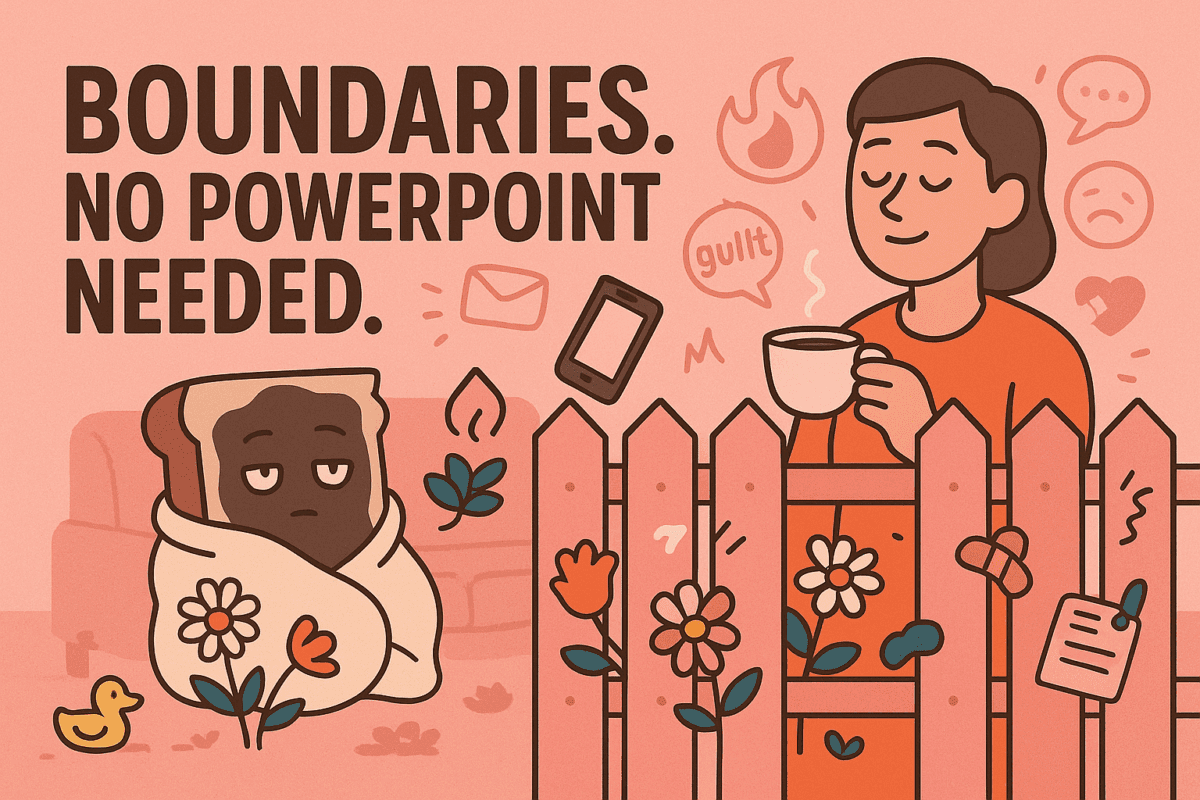
Why Setting Boundaries Feels So Damn Hard (And How to Start Anyway)
You know what’s easier than setting a boundary? Literally anything.
Faking a smile. Swallowing your “no”. Letting someone emotionally unload on you while you mentally rearrange your funeral playlist.
If saying “no” makes you feel like you’ve committed a crime against humanity, congrats, you’ve been emotionally trained to prioritise likability over sanity.
But here’s the truth: you’re allowed to draw a line. You don’t need a PowerPoint. You don’t need permission. You just need to start.
TL;DR: Why Setting Boundaries Feels Impossible
-
You were raised to be “nice,” not honest
-
You confuse peacekeeping with connection
-
You fear rejection more than burnout
-
You think being helpful = being loved
-
You’ve mistaken emotional labour for intimacy
This isn’t your fault. But it is your responsibility to unlearn.
1. You Were Trained to Be Likeable, Not Real
From the moment you could say “okay,” you learned that pleasing others kept things calm.
Setting boundaries feels like setting off alarms. But boundaries aren’t betrayals.
How to set boundaries tip #1:
You’re not required to self-abandon so someone else can stay comfortable.
2. You Don’t Want to Be Seen as “Difficult”
You say yes while screaming no internally. You cancel on yourself before cancelling on anyone else. That’s not kindness. That’s internal people-pleasing rot.
3. You Think Boundaries Are Mean
Let’s fix that:
Boundaries are not walls. They’re filters.
They keep your peace in and the chaos out.
Setting boundaries in relationships means deciding what version of you gets shared, and when.
4. You Don’t Know How to Say No Without Explaining Yourself
If your “no” comes wrapped in a 10-minute TED Talk and 3 apologies, let’s rework it.
Try:
-
“That doesn’t work for me.”
-
“I’m focusing on myself right now.”
-
“I can’t take that on.”
-
“I’m not available for that.”
Short. Kind. Clear. Emotional boundaries 101.
5. You Feel Guilty For Having Needs
The more you’ve been relied on, the harder it feels to pull back. But guilt doesn’t mean you’re wrong, it means you’re disrupting a pattern.
People pleasing recovery starts with one word: No.
How to Actually Start Setting Boundaries
1. Start Small
Say no to a minor plan. Skip one group thread. Baby steps count.
2. Script It Out
Write it. Rehearse it. Use it like a lifeline until it becomes natural.
3. Sit With the Guilt
Feel it. Don’t obey it. Guilt is not a directive.
4. Expect Pushback
If someone freaks out over your limit, they were relying on your lack of one. That’s data, not disaster.
Let This Be the Year You Stop Apologising for Existing
If you’re fried, stretched thin, and stuck in the endless loop of yes-saying while resentment bubbles under your skin?
Hold My Ducks was written for you.
It’s not self-help. It’s a boundary-setting rally cry in book form.
Grab Hold My Ducks. The Burnout Recovery Book for People Who Are Tired of Saying Yes When They Mean No
Grab Hold My DucksWhy Setting Boundaries Feels So Damn Hard (And How to Start Anyway)
Setting boundaries feels like emotional skydiving without a parachute. Here’s why it’s so hard (especially for people-pleasers), and how to start without spiralling.
How to Say No Without Feeling Guilty (or Being a Bad Person)
If you say yes when you mean no, this is for you. Here’s how to say no without guilt, protect your energy, and stop emotionally imploding.
People Pleasing Recovery: How to Stop Saying Yes to Everyone But Yourself
Always saying yes, even when you want to scream? Learn how to stop people pleasing, set boundaries, and recover from emotional burnout.
How to Set Boundaries (Without Feeling Guilty or Explaining Yourself)
Setting boundaries feels hard, but staying burnt out feels worse. Here’s how to say no, protect your energy, and stop apologising for existing.
10 Signs You’re Heading for an Emotional Breakdown (And What to Do Before You Snap)
Feeling off, emotionally numb, or secretly fried? These 10 signs of emotional breakdown reveal you’re not lazy, you’re burnt out and need rest.
Mentally Cooked? 10 Symptoms of Mental Exhaustion (And What to Do About It)
Tired, overwhelmed, and calling yourself lazy? You might be dealing with mental exhaustion. Here’s how to spot the symptoms, and fix the spiral.







